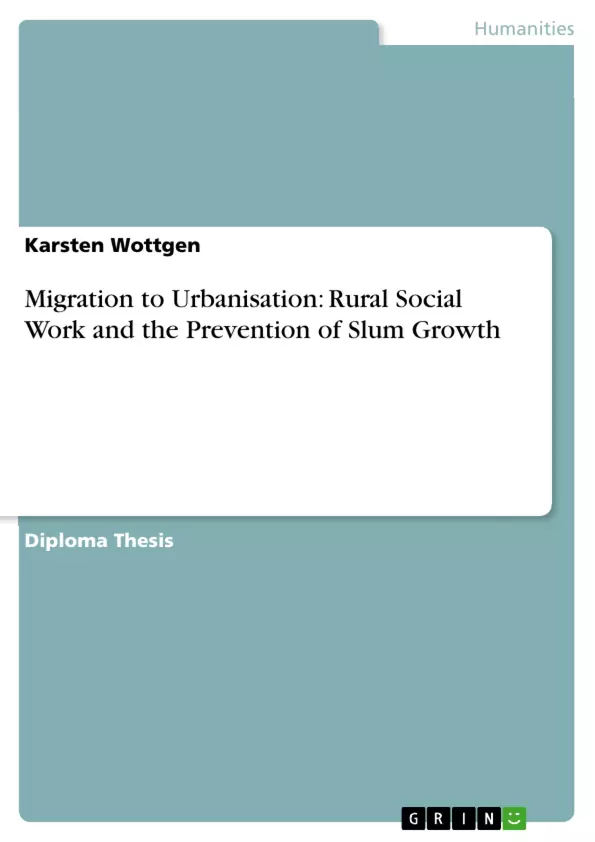Migration to urban areas is seen as a big contributor to the infrastructural problems in the cities. But, people do not migrate to the cities just because of the bright city lights; they also face problems in the rural areas which drive them to migrate. Social work is active in working with people and it shall be found out how the situation of rural out- migration and urbanisation is and what the impacts of social work can be in the rural areas as cause oriented intervention.
Table of Contents
- INTRODUCTION
- A. COUNTRYINFORMATION ABOUT INDIA
- 1. Main data, Geography and History
- 2. History and Politics
- 3. Socio-economical aspects and poverty
- 4. Socio-cultural situation
- 4.1 Women
- 4.2 Caste System: Dalits and Adivasis
- 4.3 Education
- 4.4 Health
- 5. Summary
- B. RURAL TO URBAN MIGRATION IN THE INDIAN CONTEXT
- 1. Theoretical background of migration
- 1.1 Influences in decision- making on the micro-, meso- and macro- level
- 1.2 Distance-Approach
- 1.3 Stress- Approach
- 1.4 Migration as risk management
- 1.5 Harris- Todaro and the neo- classical approach
- 1.6 Forms of migration
- 1.6.1 Seasonal or circular migration and rural-urban contacts
- 1.6.2 Chain- migration
- 1.7 Summary
- 2. Reasons for Rural to Urban Migration
- 2.1 Rural- Urban divide
- 2.2 Reasons of migration
- 2.2.1Problems within agriculture: lack of land and irrigation
- 2.2.2 External factor for agricultural problems: Liberalization
- 2.2.3 Push- migration: Migration for survival and livelihood
- 2.2.4 Pull- Migration: Migration for betterment
- 2.3 Summary
- 3. Effects of migration with special emphasis on urbanisation and slum growth
- 3.1 Urbanisation
- 3.1.1 Urbanisation and infrastructure problems
- 3.1.2 Urbanisation, the migrant and job possibilities
- 3.1.3 Urbanisation and slums
- 3.1.4 Slums and their inhabitants
- 3.2 Other effects of migration
- 3.2.1 Economical upliftment in rural areas
- 3.2.2 Urban-rural social influences
- 3.3 Summary
- C. DEVELOPMENT AND SOCIAL WORK IN RURAL AREAS
- 1. Rural Development and the role of social work
- 1.1 Excursus: Problem and Prevention
- 1.1.1 Some considerations about 'problems'?
- 1.1.2 Some considerations about 'prevention'?
- 1.2 Rural Development
- 1.2.1 Top-down approach
- 1.2.2 Bottom-up approach
- 1.3 Social Development
- 1.4 Cause oriented work - Why Rural social work?
- 1.4.1 Why Rural?
- 1.4.2 Social work: Working need, cause and people oriented
- 1.5 Summary
- 2. Social Work
- 2.1 Social work basics
- 2.1.1 Clients of social work
- 2.1.2 Social work ethics
- 2.1.3 Social workers' skills
- 2.2. Functions of Social work
- 2.3 Social work methods in this context
- 2.3.1 People participation
- 2.3.2 Working with groups
- 2.3.3 Education
- 2.4 Summary
- D. REASONS FOR MIGRATION AND RURAL SOCIAL WORK: A DISCUSSION ON THE EXAMPLE OF FIVE NGOs
- 1. NGOs as a example
- 1.1 The strength of NGOs
- 1.2 Five Gujarat Based NGOs and their approach to rural social work
- 1.2.1 AKRSP (I) (Aga Khan Rural Support Programme- India)
- 1.2.2 ASAG (Ahmedabad Study Action Group)
- 1.2.3 BSC (Behaviour Science Centre)
- 1.2.4 DISHA (Development Initiatives for Social and Human Action)
- 1.2.5 MARAG (Maldhari Rural Action Group)
- 1.3 Summary
- 2. Reasons for migration and the impact of social work
- 2.1 Education and migration
- 2.1.1 Formal education and NGOs activities
- 2.1.2 Non-formal education, NGOs and social work
- 2.2 Land
- 2.3 Water
- 2.4 Income and Employment
- 2.5 Food and Health
- 2.6 Summary
- E. CONCLUSION
Objectives and Key Themes
This paper investigates the role of social work in addressing rural to urban migration and the subsequent growth of slums in urban areas. It particularly focuses on India as a case study. The goal is to determine if social work interventions in rural areas can positively impact migration patterns and potentially slow down urbanisation and slum growth.
- Rural to urban migration in the Indian context
- The role of social work in rural development
- The relationship between rural development and urbanisation
- The impact of social work on migration reasons
- The effectiveness of NGOs in addressing rural social issues
Chapter Summaries
The paper begins by providing an overview of India, including its geography, history, socio-economic situation, and socio-cultural context. Chapter B delves into the theoretical background of migration, outlining various approaches to understanding migration decisions and processes. It then examines the specific reasons for rural to urban migration in India, focusing on factors such as agricultural problems, poverty, and lack of opportunities. Chapter C explores the concept of rural development and its connection to social work. It discusses different approaches to rural development, emphasizing the need for cause-oriented social work interventions in rural areas. Chapter D analyzes the work of five different NGOs in Gujarat, highlighting their approaches to rural social work and their impact on migration reasons.
Keywords
This work examines rural to urban migration, urbanisation, slum growth, social work, rural development, NGOs, poverty, education, land, water, income, employment, health, India, Gujarat.
- Quote paper
- Karsten Wottgen (Author), 2003, Migration to Urbanisation: Rural Social Work and the Prevention of Slum Growth, Munich, GRIN Verlag, https://www.grin.com/document/24022



